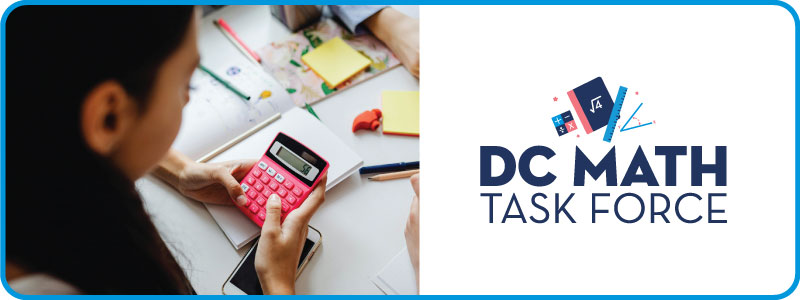
Read the Math Task Force Report
The Office of the State Superintendent of Education (OSSE) established the DC Math Task Force (MTF) to unite stakeholders and leaders from across the city in a shared effort to improve math achievement for all students. Comprised of representatives from District agencies, local education agencies (LEAs), and community stakeholders, the DC Math Task Force was charged with creating a comprehensive, evidence-based plan to ensure all students achieve proficiency in math skills and concepts—preparing them to succeed as critical thinkers and problem-solvers in school and beyond.
The Task Force engaged in a deep review of research, assessment data, national policy, and community input, identifying high-impact strategies in seven key areas to strengthen effective math instruction:
1. HIGH-QUALITY INSTRUCTIONAL MATERIALS (HQIM)
The Task Force recommends that all DC LEAs select, adopt, and implement HQIM for grades K-8 and all math courses required for graduation.
2. PROFESSIONAL LEARNING – EVIDENCE-BASED MATH INSTRUCTION COMPETENCY
The Task Force recommends that all K-12 math teachers, including special education teachers and EL teachers responsible for teaching math, as well as math specialists, instructional coaches, and interventionists, be required to demonstrate competency in evidence-based math instruction.
3. PROFESSIONAL LEARNING – CONTENT KNOWLEDGE COMPETENCY
The Task Force recommends that all educators teaching math in grades K-8 and educators teaching math courses required for high school graduation in DC demonstrate competency on major grade-band content.
4. PROFESSIONAL LEARNING – EDUCATOR DEVELOPMENT AND SUPPORT
To provide on-the-job support for math educators, the Task Force recommends that OSSE develop or adopt a non-evaluative observation tool for evidence-based math instruction and pilot a math instructional leader cohort.
5. DIAGNOSTIC ASSESSMENT AND INTERVENTION
The Task Force recommends that OSSE provide tools and resources for LEAs to support alignment between math intervention and core instruction.
6. FAMILY AND COMMUNITY ENGAGEMENT
The Task Force recommends that LEAs meaningfully engage with family members and caregivers about math skill development, student math performance data, and the importance of developing a growth mindset approach to learning math.
7. CONSIDERATION FOR INTEGRATED MATH
The Task Force recommends that OSSE explore the pros and cons for adopting an Integrated Math pathway for DC high school students.
Auxiliary Groups
To further support the effort, the Task Force created two auxiliary groups: the Instructional Resources Working Group (IRWG) and the Advisory Circle.

The IRWG, composed of selected Task Force members with instructional expertise, began work in February 2025 to develop resources and instructional tools aligned to the Task Force Recommendation Areas on high-quality instructional materials and professional learning. The group will continue to convene as the recommendations indicate a need for aligned resources and tools.
The Advisory Circle, composed of community members and national mathematics leaders, convened three times between February and July 2025 to offer insight and feedback on Task Force’s work and ultimately, on the final recommendations.


